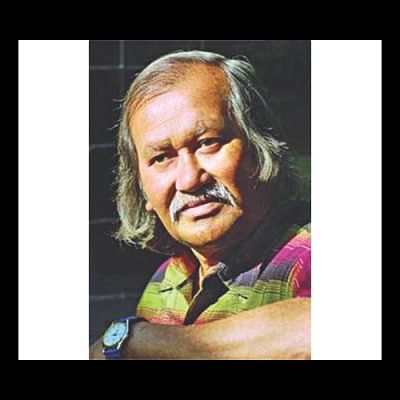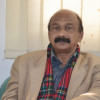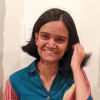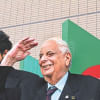Poet who bled rage, hymned love passes away

He was the poet of love first and foremost, but when it called for, he bled rage. One of the most prolific and dynamic poets on the scene of modern Bangla literature, he developed his own signature style, marked by force, simplicity and subtlety.
His rage finds expression in one of the most quoted lines of modern Bangla poems which he wrote during the 1974 famine -- “Bhat de haramjada, ta na hole manchitro khabo” (give me food, bastard, or else we will eat the map).
“[But] poetry is my first expression of love,” the poet once said. That was when he lived.
An iconic poet of the 1970s and 1980s and a freedom fighter, Rafiq Azad died yesterday. He was 75.
He breathed his last at 2:10pm at the Intensive Care Unit of Bangabandhu Sheikh Mujib Medical University (BSMMU) hospital in the capital, his niece Niru Shamsunnahar told The Daily Star.
Rafiq Azad, who was awarded Ekushey Padak (2013) and Bangla Academy Award (1981), had been fighting for life for the last 58 days. He had suffered a brain stroke and was admitted to BIRDEM hospital and later transferred to the BSMMU.
The poet left behind his wife poet Prof Dilara Hafiz, four sons and two daughters, friends, fans, a host of relatives and well-wishers to mourn his death.
Abboy Azad, one of the poet's sons, urged all to pray for his father's departed soul. “My father had no regrets,” he said.
His body will be kept at the BIRDEM mortuary until Monday, and will be taken to the Central Shaheed Minar at 10:00am on the day for people to pay their last tribute.
Later, his body will be taken to the Bangla Academy premises. Following his namaz-e-janaza at Dhaka University Central Mosque, the poet will be laid to eternal rest at Martyred Intellectuals' Graveyard in Mirpur the same day.
Renowned poet and ambidextrous litterateur Syed Shamsul Haq sees the demise of Rafiq Azad as “the departure of the brightest star” from the sky of Bangla poetry.
“Soon after hearing the news, I rushed there [hospital] and gazed at his face. I touched his hand that took up arms to fight for the country's liberation and at the same time wrote poems about injustice, exploitation, love and rebellion,” he told The Daily Star.
In the 1960s, Rafiq Azad and Abdul Mannan Syed played the greatest role in shaping up the tone, nature and subjects of poetry, Shamsul Haq added.
His strong, intense verses deal with political, social and personal issues. His poetry reflects his experiences of the Liberation War, in which he fought. The poet once said, “As a freedom fighter, I think the spirit of Liberation War allows me to explore myself with new thought patterns, which is reflected in my poems.”
Nature is another recurring theme in his poems. “I have been a keen observer of nature since childhood. Images of seasonal change, sailing boats and paddy fields nourish my soul and inspire me,” the poet said in an interview when he received Ekushey Padak in 2013.
The poet was born on February 14, 1941, at Guni village in Ghatail upazila of Tangail. His contribution to Bangla literature is priceless. He was the editor of Bangla Academy's monthly literary magazine “Uttaradhikar”.
He taught Bangla literature at Maulana Muhammad Ali College in Tangail.
Rafiq Azad had his primary education from Sadhuty Middle English School, and developed a keen interest in writing from his childhood.
He was one of the most prominent young poets in the post-liberation period. Since then, he began experimenting with language and poetic forms, where surrealistic approach was noticeable. His first book of poetry was published in 1973. The following year, Bangladesh experienced a famine-like situation. The crisis, prevailing across the country at the time, prompted him to write one of his most notable lines -- “Bhat de haramjada, ta na hole manchitro khabo.”
During the period and afterwards, Azad's poetry changed its course a bit and became more personal, lyrical and romantic.
His notable works include: “Prokriti O Premer Kobita”, “Ashombhob-er Paye”, “Sahashra Sundar”, “Haturir Nichey Jibon”, “Porikirno Panchala Amar Swadesh”, “Khub Beshi Durey Noy”, “Karo Ashru Paat”, “Pagolar Thekey Premikar Chithi”, “Seemaboddho Jol-e, Simito Sabuj-e”, and “Apar Aranya”.
Meanwhile, Prime Minister Sheikh Hasina, in a condolence message, expressed deep shock at the death of the poet and prayed for eternal peace of the departed soul and conveyed profound sympathy to the bereaved family, reports UNB.
President Abdul Hamid expressed profound shock at the death of Rafiq Azad.
Terming Azad's death an irreparable loss, he said the poet's contribution to the world of Bangla poem would be remembered forever, reports BSS.
In a condolence message, BNP Chairperson Khaleda Zia said, “I am deeply shocked and saddened by the death of the country's renowned poet and journalist Rafiq Azad.”

 For all latest news, follow The Daily Star's Google News channel.
For all latest news, follow The Daily Star's Google News channel. 







Comments